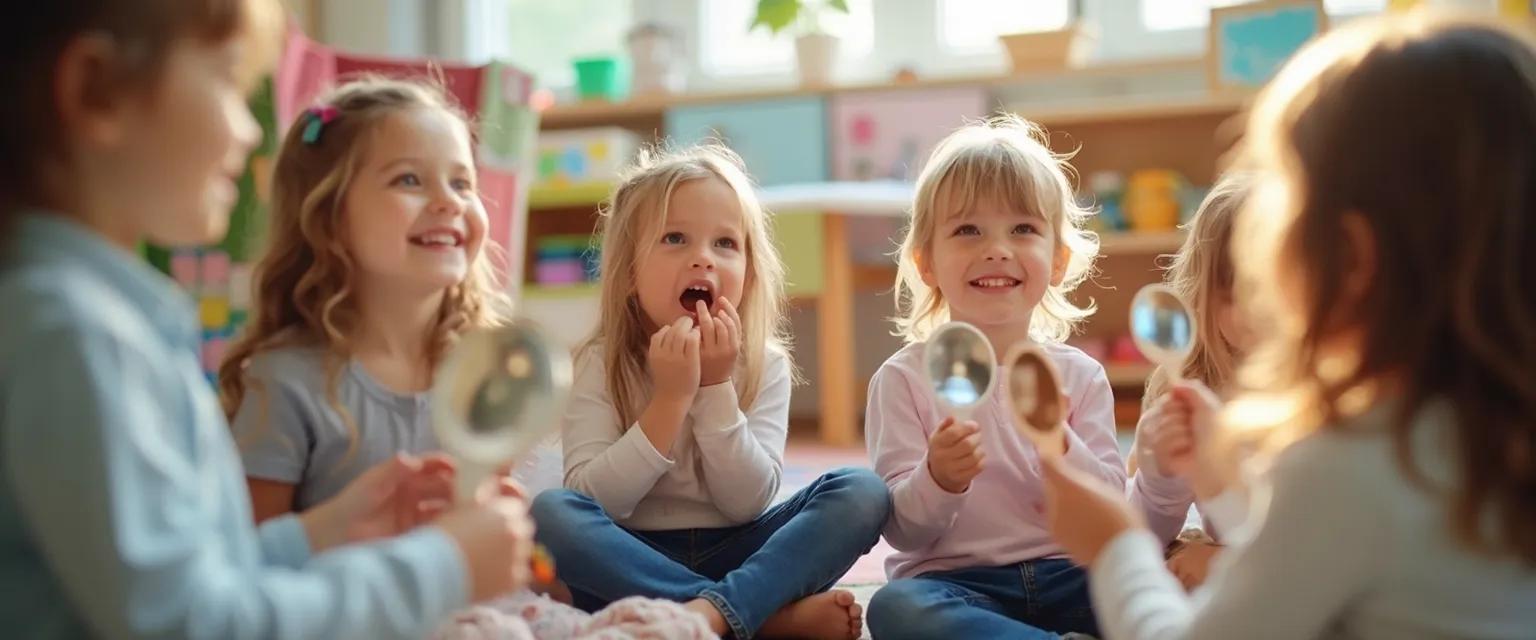Mirror Games: 5 Playful Activities for Self-Awareness for Kindergarten
Ever watched a kindergartner make funny faces in the mirror? That natural fascination with reflections offers a perfect opportunity for developing self awareness for kindergarten children. These formative years represent a critical window when young minds begin recognizing their own emotions and those of others. Incorporating mirror activities into kindergarten routines creates engaging ways for children to explore their emotional landscapes while having fun.
Self awareness for kindergarten students involves more than just recognizing themselves in a mirror—it's about understanding facial expressions, body language, and the connection between internal feelings and external displays. These skills form the foundation of emotional intelligence that will serve children throughout their lives. By introducing resilience building activities like mirror games, we help young learners develop crucial social-emotional skills.
Mirror activities naturally captivate kindergartners while teaching valuable lessons about emotion recognition and empathy. These playful exercises require minimal materials—often just a mirror or partner—making them accessible for any classroom or home setting. The best self awareness for kindergarten approaches combine play with learning, creating meaningful experiences that children eagerly embrace.
5 Mirror Games That Boost Self Awareness For Kindergarten Children
These five mirror-based activities provide effective self awareness for kindergarten development through play-based learning. Each game targets specific aspects of emotional intelligence while keeping young children engaged.
Game 1: Emotion Mimics
This simple yet powerful activity involves children taking turns making different facial expressions in a mirror while others guess the emotion. Start with basic emotions like happy, sad, angry, and surprised, then gradually introduce more nuanced feelings like confused, excited, or nervous. This self awareness for kindergarten technique helps children connect facial expressions with emotional vocabulary.
Game 2: Mirror, Mirror
In this paired activity, children face each other and take turns being the "person" and the "mirror." The "person" makes facial expressions and simple movements while the "mirror" copies them exactly. This exercise develops close observation skills and active communication techniques as children must pay careful attention to subtle facial changes.
Game 3: Emotion Freeze Dance
Play music and have children dance freely. When the music stops, call out an emotion, and children must freeze while displaying that feeling on their faces. For added self awareness for kindergarten practice, place mirrors around the room so children can see their own expressions during the "freeze" moments.
Game 4: Face Detective
Show children pictures of faces expressing different emotions, then have them recreate those expressions while looking in a mirror. Discuss what specific facial features change with each emotion (raised eyebrows, smiling mouth, furrowed brow). This detailed observation enhances self awareness for kindergarten students by breaking down expressions into component parts.
Game 5: Story Face
Read a story with emotional content, pausing at key moments to have children show how the character might feel using their own faces. With mirrors, they can see their expressions and compare them with friends, learning that emotions can look different on different people.
These games require minimal materials—typically just a mirror (or small hand mirrors for each child), picture books, and perhaps music for the freeze dance. The simplicity makes these self awareness for kindergarten strategies easy to implement in various settings.
Enhancing Self Awareness For Kindergarten Success Through Daily Practice
Consistency is key when developing emotional intelligence in young children. Incorporating these mirror activities into daily kindergarten routines reinforces self awareness for kindergarten students in natural, unforced ways. Consider dedicating 5-10 minutes during morning circle time or transition periods for a quick mirror game.
Parents can extend these learnings at home by creating a "feelings corner" with a safe mirror where children can practice identifying emotions. During everyday routines like brushing teeth or getting dressed, parents can use mirror time to discuss feelings and facial expressions, strengthening the self awareness for kindergarten skills being taught in the classroom.
The long-term benefits of developing strong emotional recognition skills in kindergarten are substantial. Research shows that children with developed emotional intelligence demonstrate better mental clarity skills and social relationships throughout their education. They're better equipped to navigate conflicts, express needs appropriately, and understand others' perspectives.
To adapt these activities for different ability levels, consider these modifications:
- For children needing more challenge: Introduce more complex emotions like disappointed, proud, or embarrassed
- For children needing support: Focus on the four basic emotions with exaggerated expressions before introducing subtler feelings
- For diverse learners: Incorporate visual emotion cards alongside mirror activities for additional reinforcement
By making these mirror games a regular part of kindergarten learning, we provide children with practical self awareness for kindergarten techniques that will serve them throughout their educational journey and beyond. These playful activities lay the groundwork for emotional literacy, empathy, and social success—all while children delight in the simple joy of making faces in the mirror.




